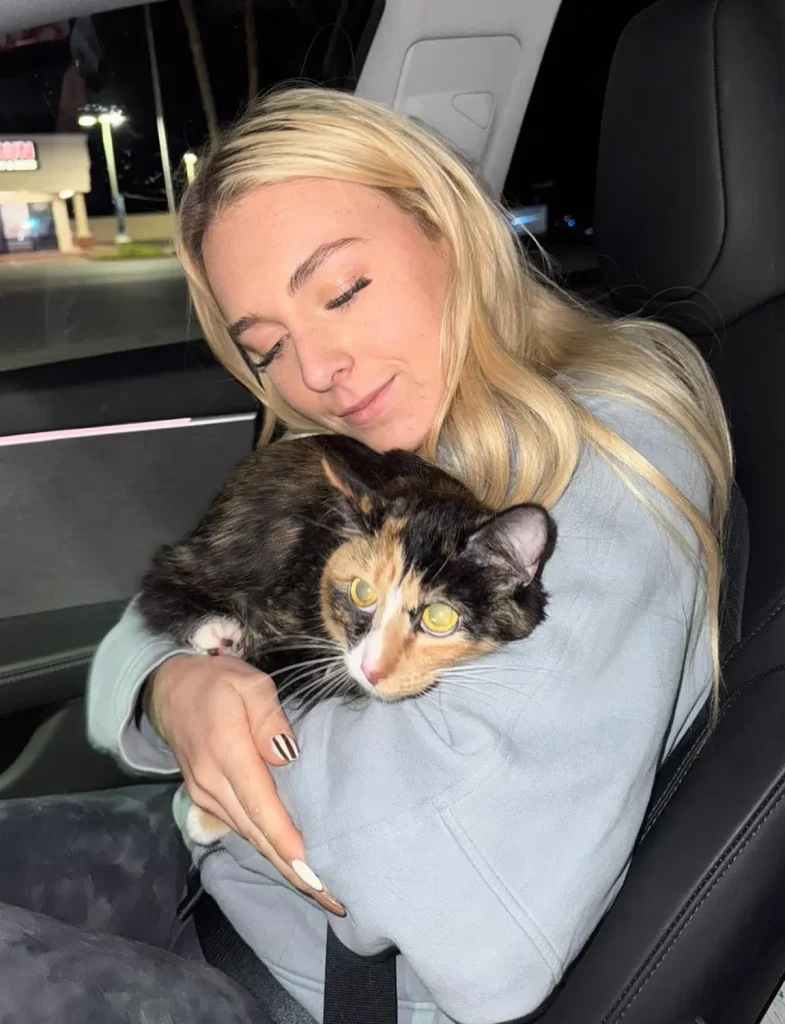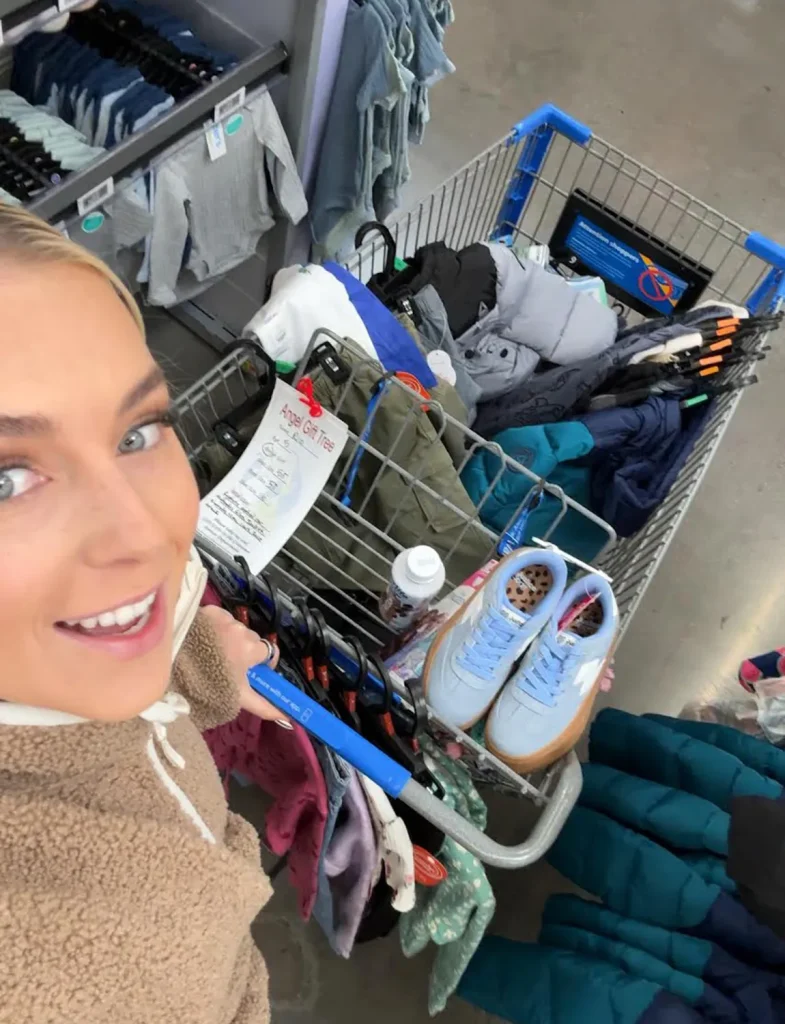She Bought the Wrong Angel Tree Gift. TikTok Called Her Out. What This Woman Did Next Turned a Simple Walmart Trip Into a Viral Holiday Redemption Story
The holidays are supposed to be simple. A cart full of wrapping paper, maybe a couple of presents for family, and a stop by the Angel Tree to pick up a wish list card from a child whose Christmas depends on the generosity of strangers. For most people, it’s a quiet moment of giving that never makes headlines. But for one woman, a routine Walmart errand turned into a viral lesson in accountability, empathy, and how fast the internet can rally around a story when kindness and public scrutiny intersect.

Her name is Serena Neel, and she never expected a single TikTok video to uproot her day. In the now-viral clip, she sits in her car proudly holding an Angel Tree tag — the kind given out every holiday season by charities and department store programs to help children in need. The card listed a child’s clothing sizes as well as a toy request, and Serena’s goal was simple: buy gifts, return them to the drop-off point, and feel good knowing she helped make someone’s Christmas a little brighter. She posted about it casually online — a feel-good clip showing her shopping and encouraging others to do the same.
The problem began with one detail that viewers couldn’t ignore. On the Angel Tree tag, the child had written that they wanted a “bluey toy,” referencing Bluey, the massively popular animated children’s show. But Serena, unaware or assuming it was spelled differently, picked out something entirely unrelated. In her mind, she was fulfilling a request. To viewers, it looked like she had ignored or misunderstood the child’s one Christmas wish.
Within hours, her comments section filled with polite but pointed corrections. “Bluey is a cartoon dog!” one wrote. “That’s not Bluey. You got the wrong thing,” said another. Some were gentler: “It’s okay, I didn’t know what Bluey was either, but you might want to exchange it.” Others were harsher, turning what she intended as a sweet moment into a public mistake. TikTok is rarely shy when it believes a child has lost out on something meaningful.

What happened next could have gone in several directions. She could have shrugged it off. She could have deleted the video. She could have ignored the comments entirely, chalking it up to internet overreaction. Instead, Serena did something that struck a nerve with millions of viewers: she got back in her car, drove back to Walmart, and filmed herself walking straight inside to fix the mistake.
Her follow-up video begins with her holding the Angel Tree card again, this time with a different expression — less playful, more determined. She looks into the camera and says, “Okay guys, you called me out. I bought the wrong thing. I genuinely didn’t know, but I’m going back to get what they actually wanted.” It was not defensive. It wasn’t performative charity. It was the simple acknowledgment that the internet was right and she was willing to do better.
As she pushes her cart through the toy aisle, narrating the process, the tone of the story shifts. The comments begin cheering her on. Hundreds of viewers write things like “THIS is how you take accountability,” and “You just restored my faith in influencers.” She films herself scanning the shelves until finally, she spots it: a Bluey playset, the smiling cartoon cattle dog printed on the front in bright colors. She holds it up with a triumphant grin and says, “We got it!”
For the first time, the internet sees something it often demands but rarely receives — a creator who listens and corrects course without making excuses. The clip earned hundreds of thousands of views within hours. People stitched it, dueted it, and praised her willingness to return to the store instead of doubling down. What had begun as a minor mistake had turned into a viral moment of teachable grace.
In messages shared afterward, Serena explained that she was raised to believe the Angel Tree is sacred — not for content, but for children whose families truly need help. “I wasn’t trying to make a viral video,” she said. “I thought I was doing something nice and people pointed out something important. So I wanted to go back and do it right. It’s a gift for a kid, not a prop for my page.”

There is something rare about watching the internet correct a stranger and not have it turn into hostility. Perhaps the timing helped. It is, after all, the holiday season — a time that brings out generosity, but also heightened sensitivity around children who might otherwise wake up to nothing under the tree. Many viewers admitted they had made similar mistakes before, whether misreading a tag, buying the wrong size, or misunderstanding what a child wanted. The difference in Serena’s case was that it happened publicly.
Her second video ends with her walking out of the store, gift bag in hand, and giving a thumbs up to the camera. She doesn’t gloat. She doesn’t overstate the moment. She simply says, “We fixed it. Thank you guys for telling me. I really didn’t know.”
That humility carried the story far beyond her personal page. Major comment sections lit up with praise not just for buying another toy, but for refusing to treat criticism as an attack. One user wrote, “This isn’t a story about getting it wrong. It’s a story about what you do next.” Another said, “She didn’t get defensive. She just said ‘Oh, I made a mistake’ and corrected it. That’s the kind of influencer energy we need.”
It wasn’t long before traditional media outlets picked up the story. PEOPLE magazine confirmed the videos and interviewed viewers who had followed the clip from the first post to the final store run. The moment resonated because it touched on something deeper than a toy mix-up. It became a small but powerful example of internet accountability done right — proof that public pressure does not always have to end in embarrassment or debate. Sometimes, it simply leads to a better outcome for a child.
The Angel Tree program itself has existed for decades, run by community organizations and supported by stores like Walmart and Target. Every year, thousands of children write down their clothing sizes and one or two gift wishes. Volunteers and donors choose tags and fulfill them anonymously, returning wrapped items before Christmas. Not every story is sentimental. Often, the requests are heartbreaking: coats, socks, diapers, or just one small toy.
That’s what made Serena’s decision to correct the mistake stand out. The toy she returned for cost a few extra dollars, but the message it sent was worth far more. When you give, give thoughtfully. When you are corrected, listen. When you share moments of charity online, remember that they involve real people on the other side.
In the weeks after the video went viral, Serena’s page saw a surge of supportive followers. Not the usual crowd chasing drama, but people who appreciated kindness with accountability. Some wrote that they had gone out and chosen Angel Tree tags for the first time because of her video. One viewer said, “Your story made me go buy gifts for a kid I will never meet.” Another said, “I realized I have been skipping the Angel Tree every year. Not this time.”
The internet is not always kind. TikTok can be ruthless when it senses inauthenticity. But in this case, something rare happened: the audience respected the response more than the original mistake. Serena did not turn the moment into a redemption arc; she simply did what was right.
In one follow-up comment, she summed it up best: “I didn’t go back to the store because the internet yelled at me. I went back because the child deserved the right gift.”
That quiet message, buried beneath thousands of excited comments and holiday emojis, may be the real reason this story resonated. It’s not about trends, clout, or even Christmas. It’s about a moment when a stranger on the internet said, “Hey, that kid asked for something specific,” and instead of arguing, the woman on the other side said, “You’re right — let me fix that.”
In a digital world where stories move faster than empathy, where public mistakes often become shame cycles, one Walmart return run became something else entirely. It became a reminder that accountability can be gentle, kindness can be corrected, and sometimes the smallest act — exchanging a toy — can restore a little faith in how we treat one another, online and off.



